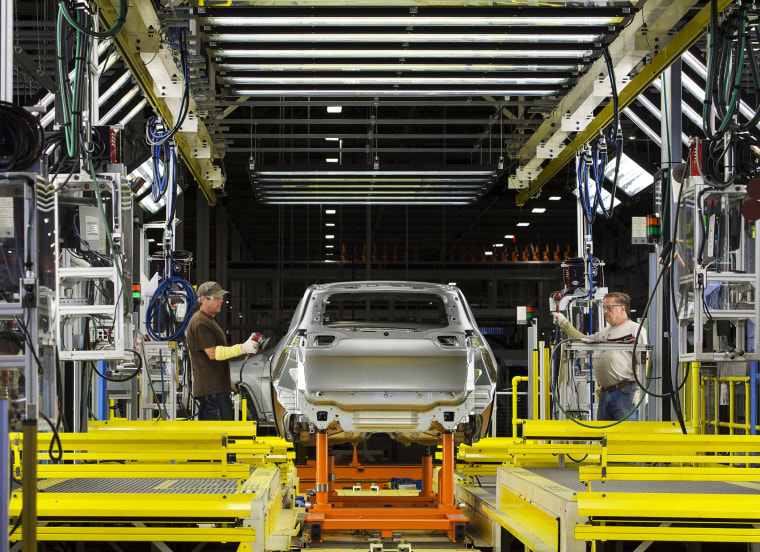Ordinarily, the fact that the Treasury Department this morning
sold its stake in something called "Ally" would hardly generate headlines, but Ally Financial is probably better known by its former name: General Motors Acceptance Corp (GMAC).
Yes, today's news means something rather important: the Troubled Asset Relief Program is now
officially over, as is the rescue of the American auto industry.
The Obama administration declared a profitable end to the Wall Street and auto bailouts on Friday, saying a final sale of stock from what was once General Motors' finance arm had closed a turbulent six-year chapter of the financial crisis. Treasury Secretary Jacob J. Lew said that while profit was not the motive to bail out Detroit and Wall Street, "it is important to note we recovered more than we disbursed."
According to Lew, the total profit for American taxpayers on TARP investments stands at $15.35 billion.
The NYT report added, "Less than $1 billion in taxpayer funds remain scattered in about 35 community banks around the country, but with the sale on Thursday of the government's last 54.9 million shares of Ally Financial ... the Treasury declared the bailouts done."
To be sure, as a matter of politics and public opinion, TARP probably is about as popular as it was when George W. Bush signed the program into law in late 2008 -- which is to say, not popular at all. The word "bailout" has taken on a sinister and menacing meaning in our discourse, to the point that it's effectively supposed to shut down debate on any idea that earns the label.
But there's still room for a credible debate about whether the program worked.
When it comes to assessing President Obama's rescue of the auto industry, there's little doubt that the effort was a striking success, predictions to the contrary notwithstanding. As we've
discussed several times, among Republicans in 2009, failure was a foregone conclusion – government intervention in the marketplace always fails, they said, and Obama big-government solution to the auto industry’s crisis simply couldn’t work.
Consider
the predictions made at the time, as pulled together by ThinkProgress.
Rep. John Boehner (R-OH): “Does anyone really believe that politicians and bureaucrats in Washington can successfully steer a multi-national corporation to economic viability?” [6/1/09]
Sen. Richard Shelby (R-AL): “It’s basically going to be a government-owned, government-run company…. It’s the road toward socialism.” [5/29/09]
RNC Chairman Michael Steele: “No matter how much the President spins GM’s bankruptcy as good for the economy, it is nothing more than another government grab of a private company and another handout to the union cronies who helped bankroll his presidential campaign.” [6/1/2009]
Sen. Jim DeMint (R-SC): “Now the government has forced taxpayers to buy these failing companies without any plausible plan for profitability. Does anyone think the same government that plans to double the national debt in five years will turn GM around in the same time?” [6/2/09]
Rep. Tom Price (R-GA): “Unfortunately, this is just another sad chapter in President Obama’s eager campaign to interject his administration in the private sector’s business dealings.” [6/2/09]
Rep. Lamar Smith (R-TX): The auto company rescues “have been the leading edge of the Obama administration’s war on capitalism.” [7/22/09]
Rep. Trent Franks (R-AZ): When government gets involved in a company, “the disaster that follows is predictable.” [7/22/09]
A guy by the name of Mitt Romney
said we could “kiss the American automotive industry goodbye” if the administration’s policy was implemented.
We now know that the right was completely, unambiguously wrong. The U.S. auto industry has been a bright spot on the economic landscape in recent years, and it hasn’t been this strong in recent memory.
And what about TARP's rescue of Wall Street? That's a little more complicated -- OK, more than a little -- and the debate will continue far beyond today. I'm of the opinion that pulling the financial sector back from the brink of collapse in 2008 and 2009 was the responsible move, and by that standard alone, the "bailout" did exactly what it set out to do.
That said, TARP could have been crafted in a more comprehensive way to restructure Wall Street, and it could have also been followed up with greater investments in Main Street.
But while that debate continues, whatever your take on the program, today marks the final page of the final chapter of one of the more ambitious government rescues in recent memory.
